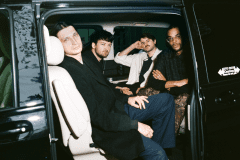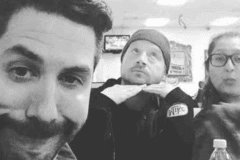Daniel Vega didn’t go far when finding inspiration when work began for They’re Not Gone-his family. Along with hearing several stories from his relatives’ lineage, Vega intertwined them with bizarre events that occurred in the 1940’s and 50’s. In the end, Vega pieced together lyrics that focus on death: the involvement, the aftermath, and how to continue on while being alive. Country twang, Latin percussion, and elements of California-drenched surf rock all accompany the goals that Vega set out with They’re Not Gone.
Ghettoblaster recently caught up with Vega to talk about a bevy of topics: what was the reasoning to explore his family’s background, the process of recording They’re Not Gone, and why he calls the new album a “very Texas sounding record”.
During the writing process for They’re Not Gone, you were inspired by stories involving your family and strange events from the 40s and 50s. How did those two intersect with each other?
From the beginning, I knew I wanted to continue writing songs in the style of “Salton Sea”, a track from our previous record. I knew I wanted the songs to be dark, moody, and minor; they were following a pattern I was trying to expand. Around that time, I was asking my Dad more questions about growing up, and I think if you dig enough into your history you come across stories that have a haunted quality to them. If you go back far enough, you’re talking about the lives of relatives that are no longer with us, and those stories share many similarities to ghost stories.
What did you discover about yourself involving your family that you didn’t know when you were writing the album?
I had never asked about my uncle John, and how his passing shaped by Dad’s story, pushing my family to move back to Mexico during the 1970’s. My uncle’s death lead in many ways to events that would shape my father, and that impressed on me the idea that death leads us forward. That story lead to other stories that were on their own very interesting, and helped me connect dots.
You said that you wanted to make a “very Texas sounding” record. What was the inspiration for going in that direction?
I’m a native Texan and I would never want to write a record that didn’t reflect that in some ways. I don’t want to do just California sounding surf music, because that’s not all that interests me. I wanted to have influences from Mexican music, or at least in vibe. What I think as a “very Texas sounding” record may not sound like Texas to anyone else. There are many more artists who are more true to Texas than I am, I’m sure.
The band’s music for 2014’s Silver Age and They’re Not Gone is heavily filled with surf rock. Were you a big fan of the genre growing up?
I was never exposed to it growing up, at least not heavily. I think many people can hear “surf” music and just feel it without knowing it, that it’s a very vibe-y energetic music. It makes me want to move, and it’s something I could write. I kind of fell into it to be honest.
How long was the recording process for They’re Not Gone?
I started writing some of the songs in late 2014, early 2015, and we started recording in February 2016 at Austin Signal with Charlie Krampsky. The recording process was amazing. I love being in the studio, and I’ve known Charlie since 2005, so it was such a blast to finally work with him. The recording process is always shorter than the writing process. The hardest thing is to hold onto songs while you scrape money together to try and do the songs justice when recording them. I called on some friends to help play organ and trumpet, and it was so fulfilling to hear the record when it was finished.
In 2013 you were starting out your career as a math teacher, but wanted to still play music. At any point from then to now have you thought of becoming a full-time musician?
I like separating my passion and my profession, so I can have complete control of the music we put out. Well, my band and I can have complete control. I think there are many pros-and-cons to being a full-time musician, and I have so much respect for the bands doing it, but I know that’s not what my path is. I love to write music and record songs, and if someone wanted to pay me for that, I wouldn’t mind, but I wouldn’t do it full time.
But of course, I’ve thought of it. Anyone who says they haven’t is lying. That’s like asking if I’ve thought about winning the lottery. Of course, I’ve thought of it. But I don’t buy tickets, unless it’s five-hundred million.
I’ve thought about it, but I’m not buying any tickets at this moment.
For They’re Not Gone, what was the band’s main goals to achieve?
I just wanted to write and record these songs, and see growth during the process. I don’t put huge goals out there, I just focus on music. I like playing shows too. My main goal is just to have a batch of songs that are better than the last batch of songs, and we did that.
What’s the plans for the band these upcoming months?
Our only plans right now is the play some shows, have a good time, and eventually work on some new and different songs. See where there are new stories to tell, and new ways to tell them. Past that, I can’t really make any plans.
(Visit Desert Culture here:
BANDCAMP: https://desertculture.bandcamp.com/
FACEBOOK: https://www.facebook.com/desertculture/
TWITTER: https://twitter.com/desert_culture
INSTAGRAM: https://www.instagram.com/desert_culture/)







Social Media